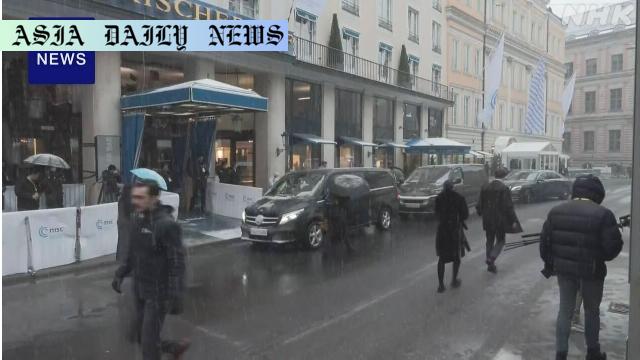Munich Security Conference: World leaders gather to deliberate on a US-specific plan to end Russia’s invasion of Ukraine.
- World leaders are gathering for the three-day Munich Security Conference, focusing on US efforts to resolve the Russia-Ukraine conflict.
- The conference will see speeches and negotiations involving figures such as Ukrainian President Zelenskyy, US Vice President Vance, and foreign ministers.
- Concerns are arising among Ukraine and European leaders as bilateral US-Russia negotiations are contemplated.
- Japan’s Foreign Minister Takeshi Iwaya will also join a G7 foreign ministers’ meeting on the sidelines of this event.

Introduction: The Munich Security Conference
The Munich Security Conference, known for fostering strategic dialogues among world leaders, returns for its annual summit this weekend. The three-day gathering will see key global decision-makers discussing vital issues, most notably strategies for resolving the ongoing conflict between Russia and Ukraine. As the war continues into its second year with significant devastation, the world looks to this conference for meaningful conversations that could set the stage for peace and stability in the region.
US Approach in Focus
At the heart of the discussions will be the United States’ role in shaping a peaceful resolution to the conflict. President Donald Trump’s recent announcement of preliminary talks with Russian President Vladimir Putin has raised both hope and concern. While this development signals a willingness by major powers to negotiate, it has also sparked anxiety among Ukraine and European allies who fear exclusion from the negotiation table. The conference provides an opportunity to clarify the US vision and its commitment to collaborating with allies to achieve a fair and lasting solution.
Key Participants at the Conference
An impressive roster of global leaders and diplomats underscores the importance of this year’s Munich Security Conference. Ukrainian President Volodymyr Zelenskyy is set to attend, a presence that reinforces the central focus on Ukraine. US Vice President JD Vance, who will deliver a much-anticipated speech on Friday, will also meet one-on-one with Zelenskyy. In parallel, US special envoy Keith Kellogg will hold discussions regarding the US-Ukraine-Russia dynamics. Beyond the US and Ukraine, Japan’s Foreign Minister Iwaya Takeshi will join the event, participating in both the main conference and a G7 foreign ministers’ meeting on the sidelines.
Concerns of Marginalization
The prospect of bilateral talks between Russia and the US without Ukraine and Europe’s direct involvement has stirred discontent among Ukraine and its allies. While the urgency to halt the violence is universally shared, some worry that sidelining key stakeholders could undermine the broader geopolitical balance. Ukrainian leaders, in particular, have called for an inclusive framework that recognizes their sovereignty and territorial integrity at every stage of negotiation efforts.
Japan’s Growing Role in Global Diplomacy
Japan’s involvement in the Munich Security Conference is another significant dimension to watch. Represented by Foreign Minister Takeshi Iwaya, Japan is steadily expanding its role in international diplomacy. By participating in the Group of Seven (G7) foreign ministers’ meeting, Iwaya will contribute to a collective strategy that aligns with democratic values and upholds the rule of law. This marks a pivotal moment for Japan in asserting its presence in European security matters.
Implications for the Future
With numerous high-level meetings, the Munich Security Conference could potentially lay the groundwork for future peace negotiations. The dynamics between participating nations—especially the US, Ukraine, and Russia—will be closely scrutinized. Whether this event yields tangible progress or not, it remains a crucial platform for advancing dialogue and exploring solutions to one of the most pressing crises of our time.
Conclusion: A Test for Diplomacy
The Munich Security Conference stands as a testament to the indispensable nature of diplomacy in tackling complex global challenges. As leaders converge to discuss the path toward peace in Ukraine, the stakes could not be higher. The conference is a moment of reflection, decision, and action for all involved, offering a glimmer of hope in an otherwise turbulent time.



Commentary
The Role of the Munich Security Conference
The Munich Security Conference consistently demonstrates its relevance in the arena of global diplomacy, and this year is no exception. The event offers a unique space where dialogue meets action—a place where leaders from diverse nations gather not just to debate but to strategize actionable solutions. This year’s focus on resolving the Russia-Ukraine conflict underscores its significance in navigating some of the world’s biggest challenges.
Balancing Power and Inclusivity
As promising as the recent US-Russia phone talks may seem, concerns about excluding Ukraine and Europe from these discussions are valid. Such actions could risk undermining the principles of trust and unity among allies. Ukraine’s autonomy and perspective are central to any lasting agreement, and sidelining them may create further rifts in international collaboration.
Japan’s Strategic Involvement
Japan’s participation adds an interesting dimension to this global forum. While traditionally seen as more of an economic power, Japan’s active engagement in global security discussions signals its increasing willingness to take on a greater leadership role. This dynamic shift is particularly important as global security becomes an increasingly interconnected issue requiring diverse stakeholders.
The Stakes for Diplomacy
Ultimately, the Munich Security Conference offers an unparalleled opportunity to achieve progress on a geopolitical challenge of immense proportions. This is more than just another summit; it’s a moment to define the future of diplomacy. The true measure of success will not only be in the decisions made but in the collaborative approaches that help keep the world on a path to peace and stability.